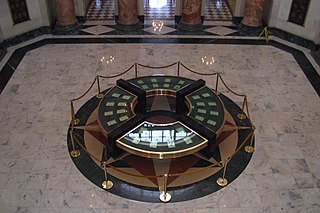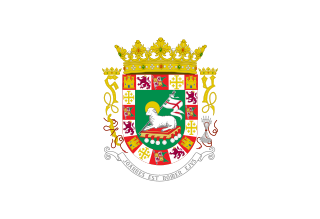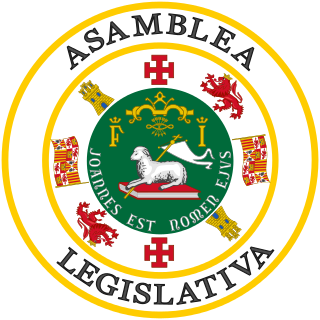Article Four of the Constitution of Puerto Rico describes the powers, structure, functions, responsibilities, and legal scope of the Governor of Puerto Rico, the executive branch of the government of Puerto Rico. [1] The article establishes the term length of the governor and the requirements to hold such post, as well as establishing the governor as commander-in-chief of the militia, namely the Puerto Rico National Guard. [2] It also establishes that the governor must present a State of the State address to the Legislative Assembly each year, as well as a report on the Budget of the Government of Puerto Rico. [2]

The Constitution of the Commonwealth of Puerto Rico is the controlling government document of Puerto Rico. It is composed of nine articles detailing the structure of the government as well as the function of several of its institutions. The document also contains an extensive and specific bill of rights. Since Puerto Rico is a commonwealth of the United States, the Puerto Rico Constitution is bound to adhere to the postulates of the U.S. Constitution due to the Supremacy Clause, and of relevant Federal legislation due to the Territorial Clause.

The governor of Puerto Rico is the head of government of Puerto Rico and, by its nature, constitutes the executive branch of the government of the island. The governor is also the commander-in-chief of the island's military forces, the Puerto Rico National Guard.

The executive branch of the government of Puerto Rico is responsible for executing the laws of Puerto Rico, as well as causing them to be executed. Article IV of the Constitution of Puerto Rico vests the executive power on the Governor—whom by its nature forms the executive branch.
The article also establishes the Council of Secretaries, and that all secretaries must be appointed with the advice and consent from the Senate of Puerto Rico, except for the Secretary of State which requires the advice and consent of the House of Representatives as well. [3]
Advice and consent is an English phrase frequently used in enacting formulae of bills and in other legal or constitutional contexts. It describes either of two situations: where a weak executive branch of a government enacts something previously approved of by the legislative branch or where the legislative branch concurs and approves something previously enacted by a strong executive branch.

The Senate of Puerto Rico is the upper house of the Legislative Assembly of Puerto Rico, the territorial legislature of Puerto Rico. The Senate, together with the House of Representatives of Puerto Rico, control the legislative branch of the government of Puerto Rico.

The Secretary of State of Puerto Rico leads all efforts that promote the cultural, political, and economical relations between Puerto Rico and foreign countries, and other jurisdictions of the United States. The post was created by Article IV of the Constitution of Puerto Rico which merely establishes that the secretary serves as acting governor when the governor is unable to perform his duties—a post similar to that of a lieutenant governor in U.S. politics. In recent times, however, the post has evolved into one similar to that of a foreign minister. Today, the secretary is the officer in charge of Puerto Rico's foreign relations, albeit under the consent of Congress or the U.S. Department of State due to Puerto Rico's political status.
Article Four also established several executive departments, namely the departments of Agriculture and Commerce, Education, Health, Justice, Labor, State, Public Works, and Treasury. [4] The Department of Agriculture and Commerce was later renamed to the Department of Agriculture, while several decades later the Department of Commerce and Economic Development was created by extraconstitutional law.

The executive departments of the government of Puerto Rico provide public services to the citizens of Puerto Rico. Currently, there are 15 departments, some with their own sub-agencies and divisions. Each department is run by a Secretary, who is named by the Governor of Puerto Rico and confirmed by the Puerto Rico Senate, except for the Secretary of State who is also confirmed by the House of Representatives. In a parliamentary system, the Departments would be the equivalent of Ministries.
The article also established the first steps towards the Puerto Rico governmental line of succession, establishing the Secretary of State as first in line of succession. [5]

The Puerto Rico governmental line of succession defines who may become or act as Governor of Puerto Rico upon the incapacity, death, resignation, or removal from office of a sitting governor or a governor-elect.






